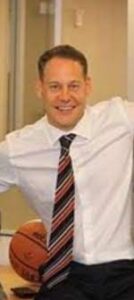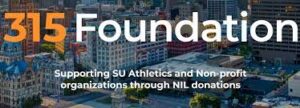The marketplace for college athletes to engage in Name/Image/Likeness (NIL) deals was created last year after the NCAA v. Alston case and now it seems like every college is ready to start spreading the wealth. There are already more than 100 “collectives” either in operation or being formed. They allow alumni/fans/whoever to donate money to assist a specific school in creating opportunities for student-athletes to make some money off of their celebrity. We have reached out to many collectives and will try to interview representatives from as many of them as possible to see how each of them operates. HoopsHD’s Jon Teitel continues our coverage with Tony DeSorbo & Mike Bristol of the 315 Foundation NIL collective, who discussed what their group is about and what it has accomplished so far.
You 2 founded an NIL collective called “315 Foundation” with a website that went live in August: how complicated was it to create (if at all), and why did you do it? We are a 501(c)(3) so being a philanthropic organization does make it a little complicated. The basic NIL rule is “no pay for play,” so a quid pro quo needs to occur where the athlete does something in exchange for money…but the IRS rule is the exact opposite. It took us a little while to figure out how to compensate athletes for working with other 501(c)(3) organizations while staying within IRS rules. With the help of some attorneys/accountants we were able to get it done. What makes us feel good is that everyone around the country seemed to figure it out the same way. You cannot really be competitive unless you have a foundation or a collective: it is as simple as that. The unique part is that we took a step back and thought that a charitable aspect would make sense. We wanted to make it a win for everyone: the community/athlete/fans.
How much of your focus is on basketball compared to football? The foundation was formed to help all of the athletes at Syracuse whether they play revenue or non-revenue sports. If there are donors who like women’s tennis then that would be great to have their support but we have been more basketball-focused out of the gate. We are primarily considered a basketball school and Coach Jim Boeheim has mentioned us in numerous interviews, which has helped get us off the ground. We are also very happy that the football team has started 5-0, which should help bring in donations for them.
What kind of connection (if any) will your group have with former players and/or Athletic Director John Wildhack? Mike is a sports marketing agent who has worked with a lot of legendary former athletes and is tied in to the Orange Alumni Network. We have a close working relationship with the Syracuse athletic department and clear everything with their compliance office. John supports the things that we are doing and Mike has worked with many of the current coaches as well. Our goal with the foundation is to create a sustainable fund. What is widely reported around the country is a few wealthy people making large donations, but the Syracuse community is extremely tied into the university for both academics/athletics. The power we are trying to harness is our massive fanbase even though we are not a huge city. If we can get a lot of small donations from numerous fans, then we can fund the program and do a lot of good work in the community. We wanted to build a value-add: people can get a tax deduction for supporting charitable work but also personally influence Syracuse winning. When our teams are winning then our local economy benefits and our civic pride soars.
What kind of deals have you been able to work out so far? We are so new that we have taken in some assets but are still in the process of doing our 1st deals, such as an upcoming charity event.
People are obviously free to do whatever they want with their hard-earned money…but do you ever have any second thoughts about whether you should be encouraging your donors to do something else like fight cancer/reduce homelessness? This is why we built a not-for-profit. Tony’s wife is on the board of an organization that medically treats people experiencing homelessness on the streets of Syracuse. We would love to have our athletes get involved with that kind of philanthropic work. They will learn the power of doing good for others. These athletes’ NIL and celebrity status is a powerful influence. We think that it can help a child with cancer feel better if they show up to give them a boost of hope in the hospital. We want to teach the impact of philanthropy and make a real difference in the lives of young athletes.
In August Coach Jim Boeheim said, “My hope would be that if we did get this going, all the players would get treated equally”: do you feel that the focus should be on helping 1-2 high-profile student-athletes or all student-athletes, and why? We feel that an athlete in a non-revenue sport is working extremely hard to be great while also going to school, just as much as the athletes who are on TV all of the time. Significant donors can tell us which sport they want their money to go to, and we can also have donors give money to athletes connected to a specific charity. I think Coach Boeheim wants all of his players (not just the stars) to get treated equally so our focus is on taking care of our current athletes.
You were quoted as saying, “We have absolutely nothing to do with recruiting and obviously want to be crystal clear about that”: why is that the case, and is it possible that might change in the future? Recruiting is the coaches’ role: we are just trying to build sustainability. Unless the NCAA rules change, we do not see that as our role. If you read what is publicly available, then it sounds like some other collectives might be more aggressive than we are. That is ok with us. We are conservative and do not want to run afoul of any NCAA rules.
Last month former top high school prospect Emoni Bates was arrested after sheriff’s deputies found a gun in a car he was driving: how concerned are you about entering contractual relationships with teenagers who might end up behaving badly? It is important for the coaches to recruit good-character kids, especially now. What we have seen in working on some deals so far is that the parents are very involved, which is great. We also have a morality clause and expect the kids to act in a responsible manner. They are learning what it means to give back and help others. We are trying to look at NIL holistically and be a positive influence. If we are taking up the time of young people with good things and providing them some guidance and teaching them the power of planning today, hopefully there will be less time for them to get into trouble. Syracuse has a good reputation for high-character kids and we want to be a part of that.
What kind of cool stuff do people get if they became 1 of your top donors? Our model is not built like that: we are being as straightforward and above board as possible to remain within IRS guidelines. We are trying to do this the right way. Our donors should receive a nice tax deduction and the benefit of knowing they personally helped Syracuse’s teams win, while helping the community in general. We might do charity galas/golf tourneys in the future but for now we will stay within the guardrails of the IRS and the NCAA.





